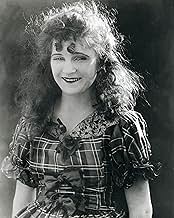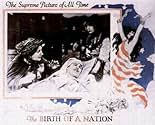Die Familie Stoneman findet ihre Freundschaft mit den vom Bürgerkrieg betroffenen Kamerunern, die beide in gegenüberliegenden Armeen kämpfen. Die Entwicklung des Krieges in ihrem Leben reich... Alles lesenDie Familie Stoneman findet ihre Freundschaft mit den vom Bürgerkrieg betroffenen Kamerunern, die beide in gegenüberliegenden Armeen kämpfen. Die Entwicklung des Krieges in ihrem Leben reicht bis hin zu Lincolns Ermordung und der Geburt des Ku Klux Klan.Die Familie Stoneman findet ihre Freundschaft mit den vom Bürgerkrieg betroffenen Kamerunern, die beide in gegenüberliegenden Armeen kämpfen. Die Entwicklung des Krieges in ihrem Leben reicht bis hin zu Lincolns Ermordung und der Geburt des Ku Klux Klan.
- Auszeichnungen
- 2 wins total
- Col. Ben Cameron aka The Little Colonel
- (as Henry Walthall)
- Silas Lynch - Mulatto Lieut. Governor
- (as George Seigmann)
- Jeff - The Blacksmith
- (as Wallace Reed)
- Abraham Lincoln
- (as Jos. Henabery)
- Wade Cameron - The Second Son
- (as J.A. Beringer)
- Duke Cameron - The Youngest Son
- (as John French)
Empfohlene Bewertungen
One of the posters remarked on how ridiculous the Klansmen's hoods looked. Actually, the original "ghost costumes" were all homemade and there was no standardized uniform- some had spikes on the head, horns, painted faces on the masks, etc.
I myself had an ancestor who was a member of the Reconstruction Ku Klux Klan, and they saw themselves as guerilla fighters against an occupying power, not as terrorists. Today we can condemn them. At the time, it must have seemed to them that the war was over, but that the battle lines were still firmly drawn.
This film is a good peek into the attitude of the general public in 1915 about Reconstruction. It became a national obsession, and probably gave impetus to Col. William Joseph Simmons's decision to "resurrect" the Klan in that year.
It really is almost like two different movies. The first part, which takes place in the era before and during the Civil War, contains little objectionable material, and it deserves praise both technically and for the acting. The second part, set in the reconstruction era, contains almost all of the disturbing material, and it also is really not all that great in terms of cinematic quality.
Then also, the degree to which "The Birth of a Nation" may have influenced the development of cinema has very likely been overstated . The controversy that it generated may very well have helped it to remain better known than other films of the era that were equally innovative and/or lavish, or nearly so.
If the movie had ended shortly after the memorable and well-crafted Ford's Theater scene, the anti-war sentiment and similar themes would remain the main focus, since the effects of war on families and individuals is depicted convincingly and thoughtfully. In that case, its occasional lapses would possibly at the worst be called "dated", given the quality of the rest of this part of the movie.
The second half, though, is completely unfortunate in almost every respect. Not only does it promote a distorted viewpoint, but the story becomes labored, and the characters lose their depth and become more one-dimensional. The purely technical side, such as the photography and the use of cross-cutting, might still be good, but much of the rest of it loses its effectiveness.
Perhaps more importantly, it really seems rather difficult to justify the credit that this one film gets in the development of cinema. There had already been numerous feature-length movies, and most of the techniques that Griffith used were also in use by others. He may well have been ahead of the pack in terms of appreciating their possibilities, but that does not mean that cinema would not have developed as it did without this particular movie.
Just as one example, the Italian epic "Cabiria", from the previous year, has the same kind of lavish scale, is quite resourceful in its techniques, and is quite entertaining, without causing so much controversy.
Other early feature-length films also include some creative efforts to adapt film-making techniques to longer running times and more complex stories. Finally, many short features from the pre-Griffith era experimented with the same kinds of techniques that he later would use systematically. There's no denying Griffith's considerable technical skill, but others of the era also deserve some credit, even if they and their works were less controversial, and are now largely forgotten as a result.
Anyone who ever complains about the political correctness or historical "revisionism" of today's academics, see this movie. And understand, that it is the work of historical "revisionists" that are responsible for teaching the facts about our nation's history, grasped out of the hands of fictions like Griffith's horrific Birth of a Nation. And don't be so smug about complaining of political correctness in the future.
And don't try to seperate this film as an artistic work with the historical perspective of the film. Keep in mind, this film was not only a portrayl of history, it was also a *part* of history. It served to defend racial segregation, lychings, and the Klan at a time when all three of those were very real political issues. It is not a coincidence that the greatest period of lychings and Jim Crow laws came shortly after this movie. In short, this film oppressed people. So don't treat it like it existed in an entertainment vacuum, unaffected by and unaffecting everything else around it.
Griffith's portrayal of Reconstruction black politicians is not only racist, but blatantly untrue. Only in rare instances and for a short time did black representatives control any Southern legislatures, and this at a time when they were the majority of voters in many Southern states! For years teachers of Reconstruction have emphasized carpetbaggers, but have ommitted the fact that the post-Reconstruction governments were founded with the explicit purpose of disenfranchising blacks and violently enforcing their underclass status. For this reason and others, Birth of a Nation's claims to historical accuracy would be comical, if not for the horrific implications of the film.
That said, this film should be seen, mainly because it provides a document of a poisonous way of thinking that is by no means dead. It also represents the pop cultural moment when Northern and Southern whites reconciled over the memory of the Civil War, mainly to the detriment of blacks. Lastly, those who want this film burned only give ammunition to the idiots who still praise the KKK. It's better to let these jerks hang themselves with their own rhetorical ropes than to let them claim victim status.
Wusstest du schon
- WissenswertesPresident Woodrow Wilson is famously rumored to have responded to the film with the remark: "It is like writing history with lightning. And my only regret is that it is all so terribly true." After the film became subject of controversy due to its heroic portrayal of the Ku Klux Klan, Wilson denied through his press secretary as to having known about the nature of the film before screening it at the White House, or having ever endorsed it. Nevertheless, Wilson's published works as a historian are closely aligned with the film's negative portrayal of Reconstruction (some of his writings are even quoted onscreen in certain prints of the film). Wilson was also notably a consistent pro-segregationist as President.
- PatzerThe Ku Klux Klan never fought or won any battles with federal troops, black or white.
- Zitate
intertitle: While youth dances the night away, childhood and old age slumber.
- Crazy CreditsThe following was listed in the opening credits: A PLEA FOR THE ART OF THE MOTION PICTURE We do not fear censorship, for we have no wish to offend with improprieties or obscenities, but we do demand, as a right, the liberty to show the dark side of wrong, that we may illuminate the bright side of virtue--the same liberty that is conceded to the art of the written word--that art to which we owe the Bible and the works of Shakespeare.
- Alternative VersionenIn both 1921 and 1927, edited versions of the film were released to reflect current political viewpoints.
- VerbindungenEdited into The Revenge of Pancho Villa (1932)
Top-Auswahl
Details
Box Office
- Budget
- 110.000 $ (geschätzt)
- Laufzeit
- 3 Std. 15 Min.(195 min)
- Sound-Mix
- Seitenverhältnis
- 1.33 : 1













































